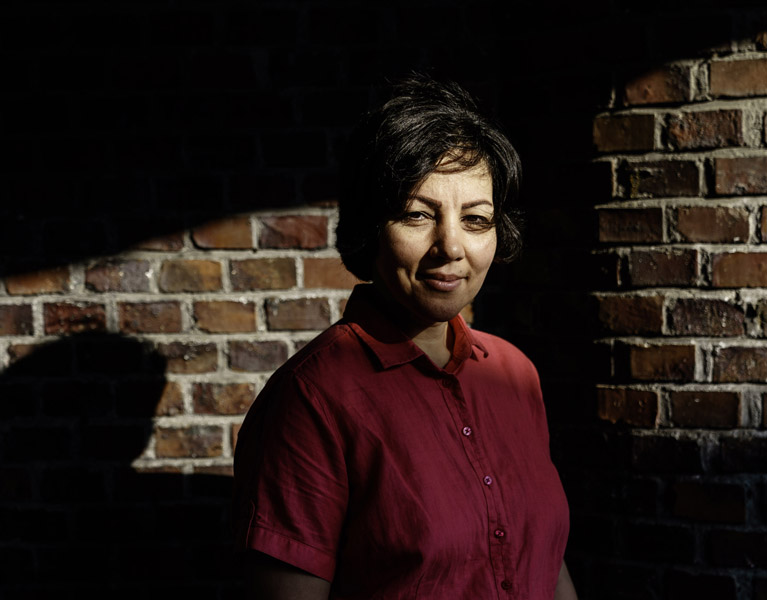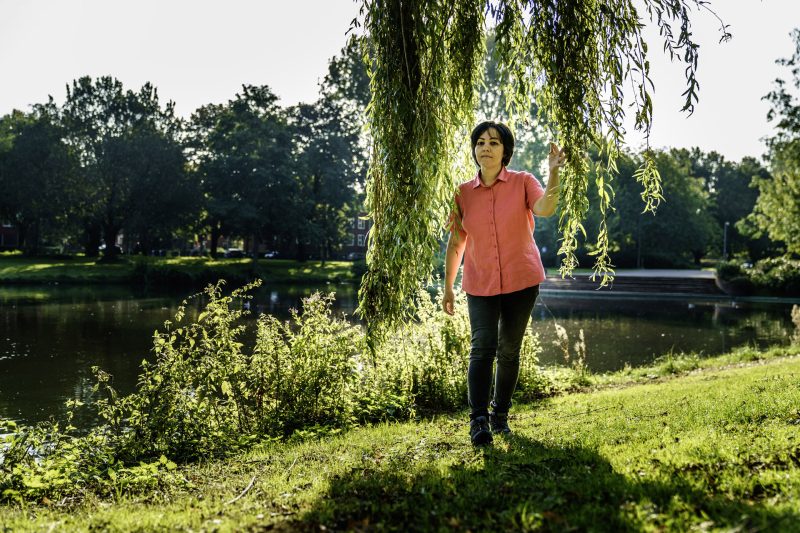
Niloofar can’t go back to Iran
‘Taking off your scarf is not a crime’
‘I’m nothing special’, she says. ‘I’m not that brave. I’m not even an activist. I’m just ordinary.’
It’s a mantra. Words that she has been repeating in her head for months now. Again and again, Niloofar Rezabandehloo (46) asks herself: how did I get here? How do I end the nightmare I find myself in? And most of all: what can I do to see my children again?
‘Sometimes I think: maybe I should just go back. Write a letter to say that I’m sorry and to please forgive me. I promise I won’t do anything again. I will wear my scarf. I will be a good woman’, she says.
But then that other thought sets in. Even if the authorities forgive her for her alleged transgressions and she can avoid the three years jail time that is hanging over her head, she will never be able to work again. She will never be able to teach again, or do what she cares about. What would her life be if she went back? Is it a life at all?
Educational centre
It’s been almost a year since Niloofar came to Groningen to do an educational master’s degree. She was over the moon when she heard she’d been accepted, because going abroad to study isn’t guaranteed when you live in Iran. ‘We are very isolated’, Niloofar says. ‘Many countries don’t give us visas. They are afraid of Iranians.’
The plan was to be away for a few months
But to her it was absolutely vital, because Niloofar wanted to start an educational centre in Iran. And even though she has a master’s degree in maths and decades of teaching experience, she needed an extra certificate related to pedagogy or education.
‘The plan was to be away for a few months’, she says. ‘I told my children, who are 14 and 17, I’d be back for Christmas and another holiday, so we wouldn’t be apart for long.’
Unfortunately, things took a turn. Two months after she had arrived in Groningen, her world came crashing down when a message from the Iranian government arrived, telling her to come ‘explain’ a few things at the courthouse.
Women’s rights
She doesn’t want the exact details mentioned in public. It might hurt her case, she says, so she’s careful. Suffice to say she was scared and horrified that she was facing a prison sentence for acting against the state, not wearing the hijab, and for taking part in a protest march for women’s rights in Iran.
Niloofar has been committed for years to helping teachers in Sistan and Baluchestan, a poor and distant region of Iran, because she feels very strongly about providing young girls and women with more educational opportunities. She does advocate for that, she says, but she’s done nothing against the regime.
What about the accusation that she refused to wear a hijab? She admits she did not wear the scarf. But that is not a criminal offence, she says. Women have taken off their scarves all over the country, something that’s punishable by a fine. ‘And I was prepared to pay that.’
They are trying to force you to do something against your beliefs
She never expected this to happen to her. Not even in a country that went ‘crazy’ when, in 2022, Mahsa Amini died in police custody after being arrested for not wearing the hijab. Her death sparked protests throughout Iran that the authorities responded to by cracking down hard.
‘Right now, eleven women from the north of Iran are being sent to jail with sentences between three and six years, just for being feminist. Who can believe that! There’s another woman sentenced to six years for the same reason. Six years of her life!’
She doesn’t know these women personally, but their stories are very close to her heart. In other instances though, the repression came much closer. Like the time when two of her friends were arrested for nothing, really, sent to jail for four months and then let go again, without ever being tried.
Intimidation
It’s all about intimidation, Niloofar says. That’s why security forces barge into a school and try to force the children to sing a propaganda song – a sixteen-year-old girl, Asra Panahi, was beaten to death when she refused.
Niloofar herself was ordered to walk on the American flag during a national holiday. ‘It’s a kind of symbolic thing we’re supposed to do. The principals of my school never really cared about that, but then they were replaced and the new principal wanted me to do it and I refused. I don’t want to do something disrespectful to another country’s flag.’
There is no future for me in Iran
The principal kept pushing, wanting to film Niloofar doing this, and threatened to report her to the Ministry of Education. ‘And she did’, Niloofar says. ‘They are trying to force you to do something against your beliefs. It’s about the way you are thinking and your personality. Humiliating everyone.’
The authorities are scrambling to hold on to their power, harassing and intimidating anyone who does anything that they don’t approve of. ‘They started forcing people like me to quit positions related to the government, and now they’re trying to force them to leave Iran. They want to make Iran into a big prison without anyone who might disobey the rules. They are trying to suppress every voice.’
Jail sentences like the one she’s facing now, aimed at a perfectly ordinary teacher, citizen and mother, are just another way to do that. ‘It’s not about the prison, we don’t even have the capacity’, she says. It’s the randomness of it all that is doing the trick.

Sorry
And so Niloofar has been studying and graduating from her master with a prison sentence hanging over her head and no idea what she should do once she is done. At some point the authorities told her that if she would just write a letter saying ‘sorry’, it would all go away. ‘But why would I? I haven’t done anything wrong. Not wearing the scarf is not a crime.’
All the while her friends back home are being harassed. One was taken in for interrogation for two days and cut ties with Niloofar out of fear. Others are afraid to even call, because their phones might be tapped. A good friend at the school where she worked can’t give her a job anymore, because she has to think of her team. Niloofar gets it, even though it leaves her incredibly torn and lonely.
And now she’s weighing her options. Going back doesn’t seem realistic anymore. ‘There is no future for me there.’
Full-time job
So what then? Ask for asylum? Find a job? ‘I’m perfectly qualified to be a teacher. I have two master’s degrees in maths and pedagogy, and I have all this teaching experience’, she says. She also did an internship at the Faculty of Economics and Business, designing a course for training TAs. When she was done, the faculty hired her on a part-time basis.
She’s working hard to teach herself Dutch, using DuoLingo. She’s improving fast, as she dedicates almost all her free time to the task, but her proficiency is not at the point she can teach. Not yet. She’s working at a restaurant and teaches mathematics online to make ends meet. What she needs, though, is a full-time job. That would get her a residential permit and that might give her a chance to bring her children over, whom she misses terribly.
And then there’s the housing issue. Her temporary contract expired recently and she’s desperately looking for a small apartment, where she can hopefully bring her kids when she’s got her life back on track. ‘I have to be patient’, she says. ‘But it’s not easy, you know? I’m no hero. I just miss my children.’